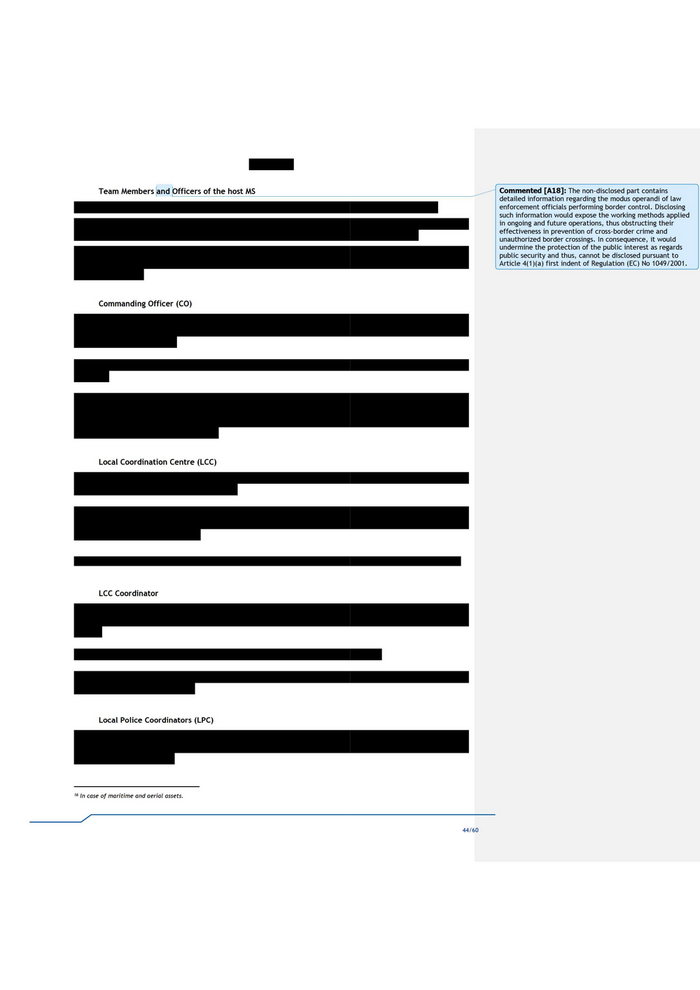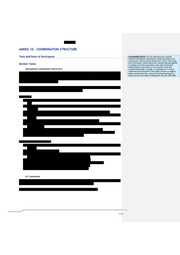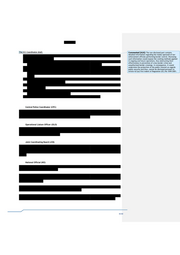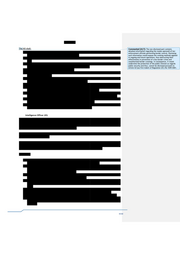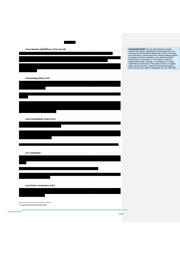imported-pad-2022-00022-documents4
Dieses Dokument ist Teil der Anfrage „Documents regarding RBI Aegean“
Heavy technical equipment | o & 3 ® = + ® oO = e oO 2 ® a2 c Oo 3 ® > r ni ® < cr ® oO I =; a m ® 2 = u 3 o =] rr ° & zJ ® - o& ® [e} >. 4 oO 2 ® a2 c Oo a3 ® = r 35/60 Commented [A12]: The non-disclosed parts contain information regarding the technical equipment deployed in the operational area by Frontex and Member States. Disclosing such information would be tantamount to disclosing the exact type and capabilities of the equipment and would enable third parties, e.g. by combining this information with other sources, to draw conclusions regarding usual positions and movement patterns. This would open way for abuse, as numbers and types of equipment used in previous operations are indicative of similar numbers and types for succeeding years. Releasing such information would thus benefit criminal networks, enabling them to change their modus operandi and, consequently, result in hampering the course of ongoing and future operations of a similar nature. This would ultimately obstruct the purpose of such operations: to counter and prevent cross-border crime and unauthorized border crossings. In this light, the disclosure of information regarding the technical equipment deployed would undermine the protection of the public interest as regards public security in the sense of Article 4(1)(a) first indent of Regulation (EC) No 1049/2001. The non-disclosed parts refer to details of the operational area and cannot be released. As ongoing operations tend to cover similar operational areas as the operations conducted in preceding years, disclosing details of previous operational areas would be tantamount to disclosing the current state of play. This would provide smuggling and other criminal networks with intelligence, enabling them to change their modus operandi, which would ultimately put the life of migrants in danger. Consequently, the course of ongoing and future operations of similar nature would be hampered by depriving the operations of any strategy and element of surprise, ultimately defeating their purpose to counter and prevent cross-border crime and unauthorized border crossings. In this light, the disclosure of documents containing such information would undermine the protection of the public interest as regards public security in the sense of Article 4(1)(a) first indent of Regulation (EC) No 1049/2001.

REMARK: Any changes related to the level of the deployed resources in the course of the RBI do not require the amendment of the Operational Plan. Those deployments will be agreed between Frontex, host and respective participating MS during implementation phase of the RBl. 36/60

BEE ANNEX 8 - OPERATIONAL BRIEFING AND DEBRIEFING Operational briefing The Operational Briefing is composed of 2 parts: « General briefing - delivered by Frontex «e National briefing - provided by the respective officers of the host MS Structure of the Operational briefing: e Crew members of the assets and officers of the host MS will be briefed at the deployment location during the first day of the deployment. Standard plan of the General Briefing: e Legal framework of Frontex (including role, tasks and current structure of Frontex). «e _ Legal framework of the Rapid Border Intervention. e Fundamental rights in Frontex activities. «e _ Frontex Code of Conduct applicable to all persons participating in Frontex Operational Activities. «e _ Description and assessment of the situation in the area. « _Operational concept, aim and objectives. « Information on implementation (period, briefing/debriefing, operational areas, participation). e Main aspects of the Rules on Use of Force. e Cooperation with third countries, other EU agencies and bodies or international organizations in the operational area. e The tasks and roles of participants. ® Command and control. « Communications within JO, FOSS, Press rules. « Reporting (JORA, incidents, SIR, DE and Frontex). e Contact details of responsible Frontex staff. «e _Organisational arrangements and logistics. « Evaluation (reports). ®e General overview about Frontex Document Alerts. «e _ Awareness session on THB and Children at Risk. Operational briefings will be complemented by EASO and EUROPOL representatives by presenting their mandate and tasks within the area where all agencies are operating together. Standard plan of the National briefing: « _ Introduction to the border management, national coast guard/border/police authorities, organizational structure and responsibilities of the respective central and local authorities. ®e Contact details of responsible officers (ICC and LCC Coordinators, Central and Local Police Coordinators, Team Leaders, OLO-TE, etc.). « Introduction to the referral procedures and the responsible national authorities in regard to the vulnerable groups / people seeking international protection. «e National legislation related to the powers and obligations of the Team Members and instructions (supported by a possible demonstration) for use of force including use of weapons. « _Transportation/storage/carry of weapons/special technical equipment. 4: 37/60 Commented [A13]: The non-disclosed part contains detailed information related to reporting tools and methods used by law enforcement officials to conduct border control tasks and counter criminal activities. Its disclosure would jeopardize the implementation of ongoing and future operation, and thus facilitate irregular migration and trafficking in human beings as the effectiveness of law enforcement measures would be significantly reduced. As disclosing this information would undermine the protection of the public interest as regards public security, this part is not disclosed pursuant to Article 4(1))a) first indent of Regulation (EC) No 1049/2001.

«e Presentation of duty plan/working schedule for the deployed crew members. e Working conditions and facilities in the specific operational area. « _ Logistical information on heavy equipment and spare parts delivery (applicable for crews only). Operational debriefing The Operational debriefing for all participants will be performed by FOC/FSO on the spot in close cooperation with the local authorities during the last days of the deployment. In case the Operational debriefing for crewmembers cannot be organized for each deployed asset, it can be limited to the NO within the ICC. Operational debriefing should consist of at least the following topics: « Brief feedback on the deployment in operation by the participants on: o cooperation with the central/local authorities and Frontex. o the assigned tasks’ execution within the overall operational concept. o information flow among deployed officers - national authorities - Frontex. «e Brief feedback of the performance of the deployed officers by the host MS representative. e Questions/answers. HE 's considered as a part of Operational debriefing.| 38/60 Commented [A14]: The non-disclosed part contains detailed information related to reporting tools and methods used by law enforcement officials to conduct border control tasks and counter criminal activities. Its disclosure would jeopardize the implementation of ongoing and future operations, and thus facilitate irregular migration and trafficking in human beings as the effectiveness of law enforcement measures would be significantly reduced. As disclosing this information would undermine the protection of the public interest as regards public security, this part is not disclosed pursuant to Article 4(1)(a) first indent of Regulation (EC) No 1049/2001 .

ANNEX 9 - COOPERATION WITH OTHER UNION BODIES, OFFICES AND AGENCIES OR INTERNATIONAL ORGANISATIONS Cooperation with EFCA and EMSA Cooperation between Frontex, the European Fisheries Control Agency (EFCA) and the European Maritime Safety Agency (EMSA) is based on a Tripartite Working Arrangement and includes sharing of maritime information, providing new surveillance and communication services, building capacity, analysing operational challenges and emerging risks in the maritime domain as well as planning and implementing multipurpose operations. The general operational cooperation between Frontex and EFCA, and Frontex and EMSA is carried out through the operational structures of the RBl and assigned contact points of the respective host MS authorities. The agencies share, in advance, via established contact points, the basic information on planned patrols of aerial and maritime assets to ensure effective planning and use of resources. Frontex and EFCA The cooperation focuses on the exchange of information, namely sightings as regards fisheries control within the operational area of the RBl. In this frame: « _EFCA’s template with the minimum requirements for sighting information to be collected is used by participants for all sightings of fishing vessels. « During EFCA’s operations EFCA provides sighting information and position of vessels, which could be of possible interest for Frontex. In addition, EFCA periodically delivers a tailored briefing package on fisheries control for the National Officials of the aerial and maritime assets deployed in the RBI. Frontex and EMSA EMSA periodically delivers a tailored briefing package on pollution control for the National Officials of the aerial and maritime assets deployed in the JO. Frontex can also contribute to EMSA workshops/events with operational experiences in relation to multipurpose maritime activities and deliver tailored briefings for that purpose. Each time a maritime or aerial asset deployed within the RBl observes a (potential) pollution spill, the Potential Marine Pollution Sighting Form will be filled in and sent to ICC/ EMSA as soon as possible for further analysis and possible action. EMSA various operational related services to be consumed within multipurpose maritime activities and delivered under umbrella of Eurosur Fusion Services. Cooperation with Europol Frontex and the European Union Agency for Law Enforcement Cooperation (Europol) cooperate during the RBl through exchange of information and intelligence. Both Agencies may contribute to each other Operational briefings, thus maintaining the awareness of the Agencies’ mandates and responsibilities to the experts deployed by Frontex and Europol. 4: 39/60

Cooperation with EUROJUST EUROJUST has appointed the contact person in the frame of EURTF. Cooperation with FRA The European Union Agency for Fundamental Rights (FRA) can support Frontex in the mainstreaming of fundamental rights in all Frontex activities. Upon request, FRA can provide advice on how to operationalise fundamental rights in Frontex operations. Frontex and FRA also cooperate in the planning and implementation of research at the external EU borders. FRA also can participate in Readmission activity as an observer. Coordination with Interpol Frontex facilitates the coordination between the host MS and International Criminal Police Organization (Interpol) during the RBI through collection of data and intelligence. In particular, the information collected during the RBI, with possible links to criminal activities such as terrorism, trafficking in human beings and smuggling of illicit goods, will be passed to the host authorities, which is a responsible entity to ensure the further dissemination to Interpol, if relevant. The access to Interpol’s global databases enabling comparison of fingerprints, photographs and travel documents to identify internationally wanted persons using false identities may be developed and ensured in the registration locations. Implementation of the SOP with NATO Referring to the conclusions of the European Council of 18/19 February 2016, Frontex is coordinating its operational activities under this RBI with the North Atlantic Treaty Organization (NATO) in the Aegean Sea in accordance with the Standard Operating Procedures (SOP). The Standard Operating Procedures (SOPs) for the cooperation between NATO activity and Frontex coordinated operation in the Aegean Sea is provided in the Annex 13. 40/60

BEE ANNEX 10 - COORDINATION STRUCTURE Tasks and Roles of Participants Member States International Coordination Centre (ICC) iM I ICC Coordinator ee TU UTUTUU 77er 41/60 Commented [A15]: The non-disclosed part contains detailed information regarding the modus operandi of law enforcement officials performing border control. Disclosing such information would expose the working methods applied in ongoing and future operations, thus obstructing their effectiveness in prevention of cross-border crime and unauthorized border crossings. In consequence, it would undermine the protection of the public interest as regards public security and thus, cannot be disclosed pursuant to Article 4(1)(a) first indent of Regulation (EC) No 1049/2001.

he ICC Coordinator shall: Central Police Coordinator (CPC) Operational Liaison Officer (OLO) Joint Coordinating Board (JCB) National Official (NO) 42/60 Commented [A16]: The non-disclosed part contains detailed information regarding the modus operandi of law enforcement officials performing border control. Disclosing such information would expose the working methods applied in ongoing and future operations, thus obstructing their effectiveness in prevention of cross-border crime and unauthorized border crossings. In consequence, it would undermine the protection of the public interest as regards public security and thus, cannot be disclosed pursuant to Article 4(1)(a) first indent of Regulation (EC) No 1049/2001.
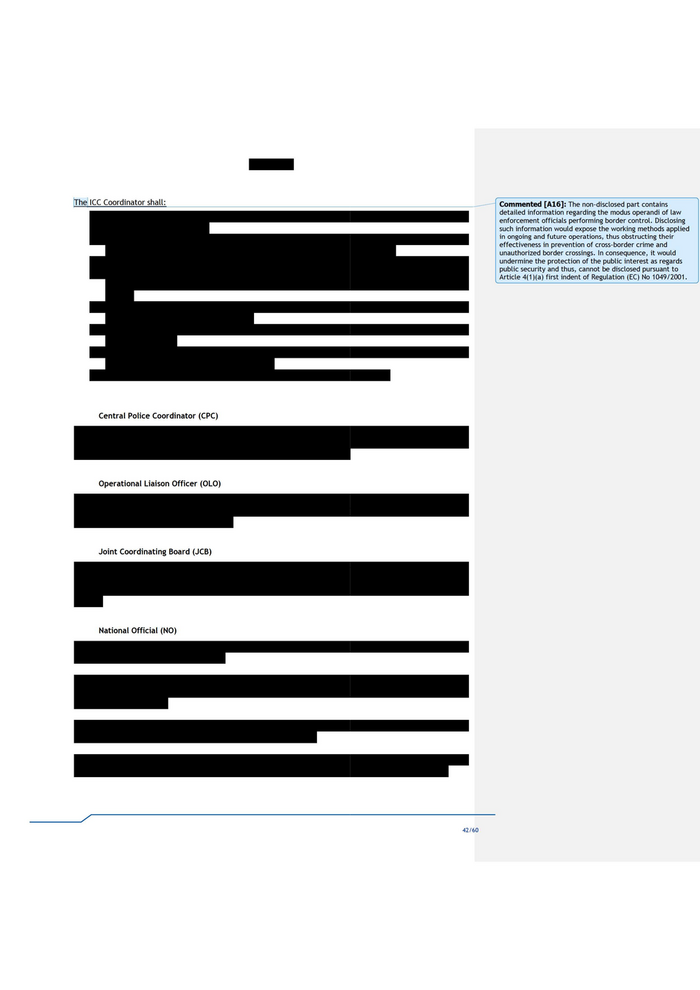
[TheiNO shall: Commented [A17]: The non-disclosed part contains detailed information regarding the modus operandi of law enforcement officials performing border control. Disclosing such information would expose the working methods applied in ongoing and future operations, thus obstructing their effectiveness in prevention of cross-border crime and unauthorized border crossings. In consequence, it would undermine the protection of the public interest as regards public security and thus, cannot be disclosed pursuant to Article 4(1)(a) first indent of Regulation (EC) No 1049/2001. Intelligence Officer (lO) a EEE U 43/60
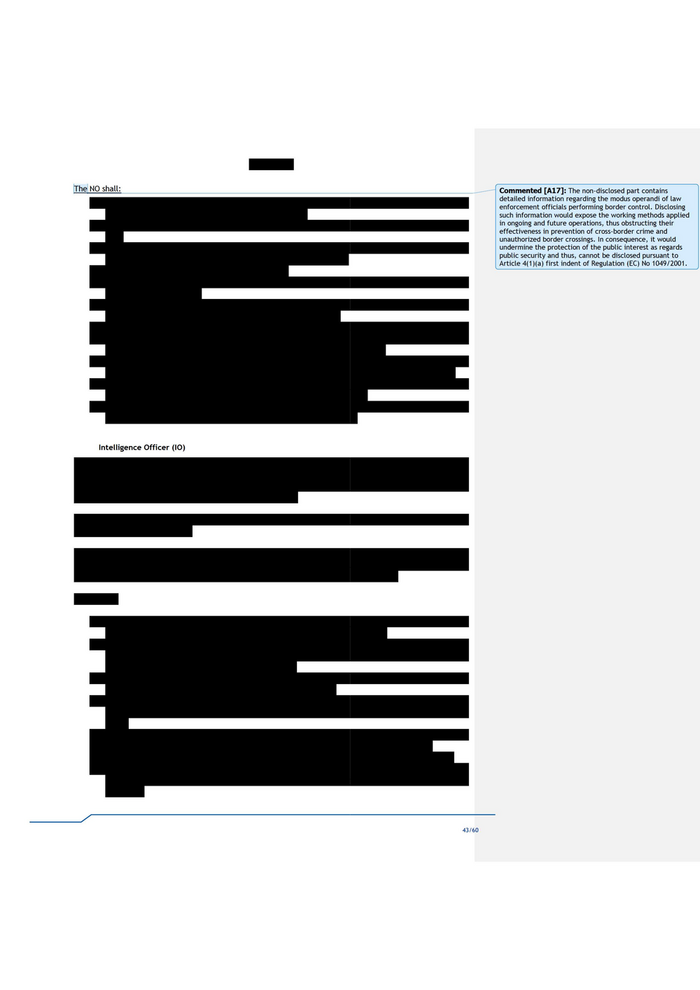
Team Members and Dfficers of the host MS Commanding Officer (CO) Local Coordination Centre (LCC) LCC Coordinator Local Police Coordinators (LPC) 16 In case of maritime and aerial assets. 77er 44/60 Commented [A138]: The non-disclosed part contains detailed information regarding the modus operandi of law enforcement officials performing border control. Disclosing such information would expose the working methods applied in ongoing and future operations, thus obstructing their effectiveness in prevention of cross-border crime and unauthorized border crossings. In consequence, it would undermine the protection of the public interest as regards public security and thus, cannot be disclosed pursuant to Article 4(1)(a) first indent of Regulation (EC) No 1049/2001.
